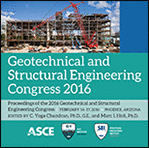Application of MASW Methods for Investigations of Shear Wave Velocity in Residual Soils of Singapore
Publication: Geotechnical and Structural Engineering Congress 2016
Abstract
Accurate geotechnical interpretation of residual soils in Singapore, ranging from weathered soil to weathered rock, becomes essential for numerous ongoing and potential underground construction activities. Nearly two thirds of Singapore is covered with residual soils, consisting of the Bukit Timah granitic formation and the Jurong sedimentary formation, hence making its interpretation crucial. For geotechnical site characterization, near surface geophysical techniques such as spectral analysis of surface waves (SASW) method and multi-channel analysis of surface waves (MASW) have been commonly employed. In terms of active source tests, seismic waves are estimated from an active seismic source (e.g., a sledge hammer) used to generate waves at the ground surface, based on a two-receiver configuration for the SASW method and a linear array of receivers in line for the MASW method. The passive MASW surface-wave technique, also called Micro-tremors array measurement, measures passive seismic waves using 2-D array receivers from micro-tremor and ambient vibrations generated from natural or artificial sources. The possible depth of investigation via the active MASW method is generally shallower than 30m due to the limited propagation of active-source energy, while that via the passive MASW method is deeper than 30m due to ambient sources with low-frequency nature. The field measurement of shear wave velocity (Vs) is a significant element for geotechnical design practices as well as seismic ground hazard evaluation. Also, it has been employed for various applications such as settlement analysis and soil structure interaction, underground cavity/anomaly detection, and ground compaction quality evaluation. In this study, active and passive MASW techniques are integrated to obtain the Vs profile of residual soils and examine the possibility of detecting bedrock depth in Singapore’s geologic context. The results of field experiments showed that this combined non-invasive MASW method can be considered as a cost efficient means to understand soil dynamic characteristics and estimate the bedrock location compared to other geophysical testing methods as well as conventional boring investigation.
Get full access to this article
View all available purchase options and get full access to this chapter.
Information & Authors
Information
Published In
Copyright
© 2016 American Society of Civil Engineers.
History
Published online: Feb 8, 2016
Authors
Metrics & Citations
Metrics
Citations
Download citation
If you have the appropriate software installed, you can download article citation data to the citation manager of your choice. Simply select your manager software from the list below and click Download.
